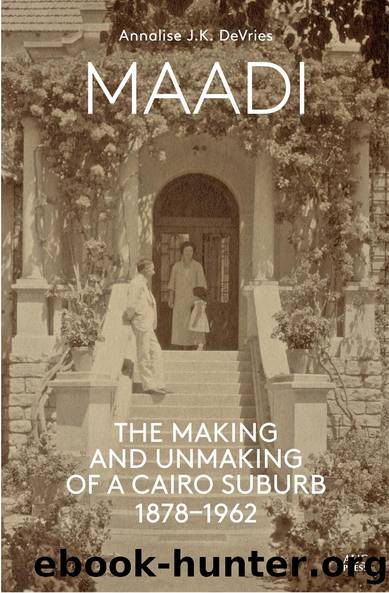Maadi by Annalise J.K. DeVries

Author:Annalise J.K. DeVries [DeVries, Annalise J.K.]
Language: eng
Format: epub
Tags: Business & Economics, International, Economics & Trade, History, Middle East, Egypt, Political Science, Public Policy, City Planning & Urban Development
ISBN: 9789774169786
Google: UJZSzQEACAAJ
Publisher: American University in Cairo Press
Published: 2021-01-15T00:47:12+00:00
8
A WAR OF TWO VILLAS
On 2 April 1940, al-Ahram reported on Egyptâs precarious position at the beginning of the Second World War. âEgypt is not at war, but prepares for war,â the headline read. The newspaper went on to report that the Egyptian economy had thus far profited from the European conflict, with cotton prices on the rise and land values likewise increasing. As for whether or not Egypt would go to war, the paper reported that according to one political official, Egypt would not enter the war unless its borders were threatened, or its ally England was targeted. That last condition proved critical to Egyptâs war experience, as alliance came to look more and more like the reimposition of imperial control.1
The al-Ahram story described how officials anticipated that the fire of war in Europe would âsparkâ a similar conflict in the Near East but had yet to do so.2 Because of the particulars of its society, however, Maadi had already seen conflicts over European racial ideologies smoldering in Egypt. Beginning in 1933, a court battle over German antisemitism unfolded, indicating how the conflicts of the Second World War would fracture the town. That August, Umberto Jabes charged Wilhelm Van Meeteren, a Maadi resident and president of Cairoâs German Club, with libel for publishing an inflammatory pamphlet based on Nazi antisemitism.3 Van Meeteren was well connected to Egyptâs elite, entertaining Dr. Hafiz âAfifi Pasha, Ahmad Kamal Pasha, and Cairoâs governor Shazli Pasha at his Maadi home.4 Jabesâs lawyer, Leon Castro, emphasized Egyptâs identity as a cosmopolitan nation in his condemnation of the pamphlet, arguing, âIf some Germans in this country were allowed to say, in effect, that Jews were bad people, it was a very serious thing because it might lead to some persecution of a minority, which in a country containing many minorities is very dangerous.â5 The pamphlet, titled âThe Extension of Judaism in Germany,â claimed that âJews did not participate in productive work but preferred to make the work of others the object of their commerce.â6 In Van Meeterenâs defense, his lawyer, German barrister Friedrich Grimm, claimed that the club published the pamphlet in response to growing anti-German demonstrations among Egyptâs Jews following Adolf Hitlerâs appointment as German chancellor. Grimm additionally claimed that Cairoâs German community âwished to be more moderate than their compatriots âat home,â and wished to omit all matters of internal German policy.â7 Two days after the initial hearing, the Cairo Civil Chambers of the Mixed Tribunals tossed out the case and ordered Jabes to pay for the action.8 The ruling served as an early indicator of the space Nazi antisemitism would find in Egypt, not only among the countryâs German community but also among some members of its ruling class.9
By 1938, this line of antisemitic reasoning specifically identified Maadiâs founders on the floor of the Egyptian senate. An item addressed to the minister of the interior stated that âJewish usurersâ had acquired land on the outskirts of Cairo, Helwan, and Alexandria and, âby their
Download
This site does not store any files on its server. We only index and link to content provided by other sites. Please contact the content providers to delete copyright contents if any and email us, we'll remove relevant links or contents immediately.
| Bahrain | Egypt |
| Iran | Iraq |
| Israel & Palestine | Jordan |
| Kuwait | Lebanon |
| Oman | Qatar |
| Saudi Arabia | Syria |
| Turkey | United Arab Emirates |
| Yemen |
Empire of the Sikhs by Patwant Singh(23085)
The Wind in My Hair by Masih Alinejad(5095)
Rise and Kill First by Ronen Bergman(4788)
The Templars by Dan Jones(4689)
The Rape of Nanking by Iris Chang(4211)
12 Strong by Doug Stanton(3550)
Blood and Sand by Alex Von Tunzelmann(3203)
Babylon's Ark by Lawrence Anthony(2678)
The History of Jihad: From Muhammad to ISIS by Spencer Robert(2628)
No Room for Small Dreams by Shimon Peres(2368)
Inside the Middle East by Avi Melamed(2356)
The Turkish Psychedelic Explosion by Daniel Spicer(2356)
Gideon's Spies: The Secret History of the Mossad by Gordon Thomas(2351)
Arabs by Eugene Rogan(2299)
The First Muslim The Story of Muhammad by Lesley Hazleton(2271)
Come, Tell Me How You Live by Mallowan Agatha Christie(2260)
Bus on Jaffa Road by Mike Kelly(2159)
1453 by Roger Crowley(2030)
Kabul 1841-42: Battle Story by Edmund Yorke(2029)
